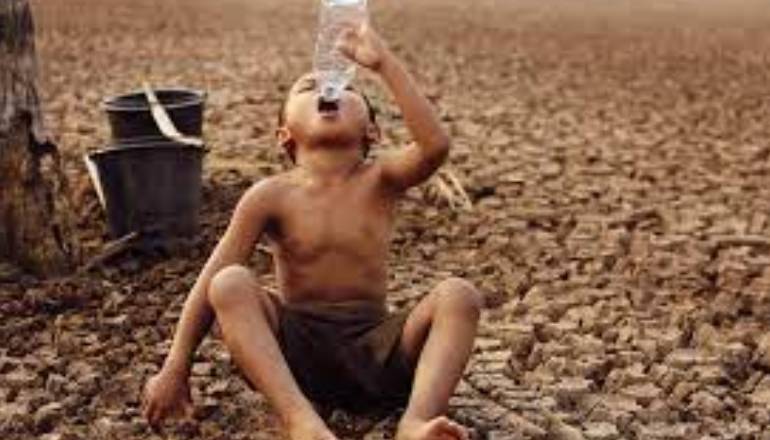The climate-changed world – with dwindling water supply and inadequate water services has impacted 739 million children globally. A new UNICEF report says that severe water scarcity is altering their mental and physical health.
One in three children or 739 million worldwide already live in areas exposed to high or very high water scarcity. Climate change is threatening to make this worse, according to the report.
Crux:
The report titled: The Climate Changed Child – released ahead of COP28, highlights the threat to children due to water vulnerability.
It analyses the impacts of three tiers of water security globally – severe water scarcity, water vulnerability, and water stress. It reinforces that inadequate drinking water and sanitation services are putting children at even greater risk.
The report is a supplement to the UNICEF’s Children’s Climate Risk (2021). Authors caution the impacts of the climate crisis include diseases, air pollution, and extreme weather events such as floods and droughts.
The environment in which children grow significantly influences their brain, lungs, immune system, and other vital organs from conception to adulthood. For instance, children are more susceptible than adults to the negative effects of air pollution. They often breathe more quickly than adults do, and they still have developing brains, lungs, and other organs.
Key findings:
• The greatest share of children exposed are in the Middle East, North Africa, and South Asia. Children live in places with limited water resources and high levels of seasonal and interannual variability, groundwater table decline, or drought risk
• The most affected children live in low- and middle-income countries in sub-Saharan Africa, Central and Southern Asia, and Eastern and South-Eastern Asia
• In 2022, 436 million children were living in areas facing extreme water vulnerability. Some of the most impacted countries include Niger, Jordan, Burkina Faso, Yemen, Chad, and Namibia, where 8 out of 10 children are exposed.
• Climate change is also leading to increased water stress. By 2050, 35 million more children are projected to be exposed to high or very high levels of water stress, with the Middle East North Africa, and South Asia currently facing the biggest shifts
• This risk to lives, health, and well-being is one of the key drivers of deaths among children under 5 from preventable diseases
• Despite their vulnerability, children have been either ignored or largely disregarded in discussions about climate change. For example, only 2.4 percent of climate finance from key multilateral climate funds support projects that incorporate child-responsive activities
What is needed?
At COP28, UNICEF is calling on world leaders and the international community to take critical steps with and for children to secure a liveable planet. These include:
i. Investment in safe drinking water and sanitation services essential as the first line of defense
ii. Elevating children within the final COP28 Cover Decision and convening an expert dialogue on children and climate change
iii. Embedding children and intergeneration equity in the Global Stocktake (GST)
iv. Including children and climate-resilient essential services within the final decision on the Global Goal for Adaptation (GGA)
v. Ensuring the Loss and Damage Fund and funding arrangements are child-responsive with child rights embedded in the fund’s governance and decision-making process.
Beyond COP28, UNICEF is calling on parties to take action to protect the lives, health, and well-being of children – including by adapting essential social services, empowering every child to be a champion for the environment, and fulfilling international sustainability and climate change agreements including rapidly reducing emissions.
UNICEF Advocates:
“The consequences of climate change are devastating for children,” said UNICEF Executive Director Catherine Russell. “Their bodies and minds are uniquely vulnerable to polluted air, poor nutrition, and extreme heat. Not only is their world-changing – with water sources drying up and terrifying weather events becoming stronger and more frequent – so too is their well-being as climate change affects their mental and physical health. Children are demanding change, but their needs are far too often relegated to the sidelines.”
“Children and young people have consistently made urgent calls for their voices to be heard on the climate crisis, but they have almost no formal role in climate policy and decision-making. They are rarely considered in existing climate adaptation, mitigation, or finance plans and actions,” Russell said. “It is our collective responsibility to put every child at the center of urgent global climate action.”

